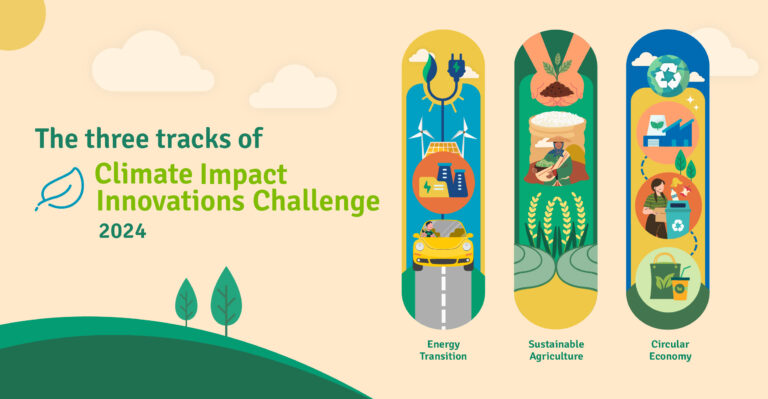One Saturday in October 2023, thick smog blanketed the runways of Soekarno-Hatta International Airport, Jakarta, Indonesia, forcing several inbound flights to be diverted to other airports. The heavy smog was from a massive landfill fire that started the day before and would take days to extinguish after burning through almost the entire landfill. Just weeks earlier, firefighters battled a persistent wildfire that ravaged savanna fields and forests in Mount Bromo for over a week.
Fires razed nearly one million hectares of lands and forests in Indonesia in 2023, as the country suffered from unusually scorching weather due to climate change. Severe drought caused crop failures and rice prices to increase significantly. Meanwhile, El Niño is still predicted to intensify into 2024 and expose hundreds of millions to the impacts of extreme weather.
Indonesia’s largest climate tech pitching competition
As climate change is becoming more urgent, the financial sector is experiencing major disruptive trends favoring investment in climate solutions. Recognizing Indonesia’s pivotal role in the global fight against climate change due to its size, location, and resources, there is a need to encourage private investments in developing technologies that can expand the startup ecosystem and accelerate the transition to a low-carbon economy by backing climate tech companies from their early stages.
The Climate Impact Innovations Challenge (CIIC) is Indonesia’s largest climate tech pitching competition organized by East Ventures and Temasek Foundation. Following the success of the 2023 edition, CIIC 2024 continues to provide a platform for tech innovators to showcase their sustainable solutions. The applicants will compete for a total prize pool of Rp 10 billion to pilot their solutions in Indonesia, competing in one of three tracks: Energy Transition, Sustainable Agriculture, and Circular Economy.
Why Energy Transition?
Southeast Asia is the world’s fourth-largest energy consumer, with energy accounting for 65% of greenhouse gas (GHG) emissions. To meet its energy needs, the region relies heavily on fossil fuels (83% in 2020), while renewable energy sources lag behind (14.2%). This dependence on fossil fuels not only heightens vulnerability to energy price shocks and supply constraints but also has caused the intensity of El Niño and other climate events to become more extreme. Prioritizing renewable energy becomes even more crucial, considering energy demand is projected to triple by 2050.
Investing in the energy transition spectrum, including renewable energy, energy efficiency, and electrification, can slash 90% of energy-related carbon emissions. Safeguarding energy security can yield substantial economic advantages, such as increasing GDP by 3.4% between 2021 and 2050, and generating 6 million renewable energy jobs by 2050.
We seek innovative ideas and solutions that can facilitate an inclusive and cost-effective transition to renewable energy, contributing to the reduction and removal of carbon emissions. The solutions proposed in the pitching competition should be carbon negative in the overall lifecycle and have zero/minimal externalities, technology-based, economically viable and scalable for market adoption. Read the full criteria for energy transition solutions here.
Why Sustainable Agriculture?
Agriculture emerges as a cornerstone of Southeast Asia’s economy, contributing over 10.5% to its GDP and representing approximately 30% of global rice production. However, agricultural activities like fuel-intensive farming, inefficient irrigation, and burning crop residues can also contribute to GHG emissions. Extreme climate events further complicate these issues by disrupting crop production and endangering vital marine ecosystems that support aquaculture, heightening the risk of food insecurity.
Sustainable agriculture is farming practices that meet current needs while also ensuring the long-term viability of agricultural systems. This involves minimizing environmental impacts such as soil erosion, water pollution, and loss of biodiversity, while also promoting economic viability, social equity, and resilience to climate change. Shifting to sustainable agriculture practices potentially reduces GHG emissions by 20% by 2050, while also doubling current yield and generating 6.5 million jobs by 2030 in Southeast Asia.
We seek innovative ideas and solutions that enhance food production and improve agricultural practices in the face of a changing climate. The solutions proposed in the pitching competition should have sustainable and replicable business models that improve the livelihoods of farmers and food security while reducing soil degradation and carbon emissions. Read the full criteria for sustainable agriculture solutions here.
Why Circular Economy?
The rapid economic growth in Southeast Asia has led to a significant increase in consumption and, as a result, a substantial rise in waste production. Many Southeast Asian countries lack the adequate waste infrastructure, with Southeast Asia housing half of the top 10 contributors to plastic pollution worldwide. The prevalence of mismanaged waste, coupled with low recycling rates and reliance on environmentally harmful disposal methods, poses a grave threat to the environment and public health.
The circular economy is an economic model that minimizes waste and maximizes resource use by maintaining the value of products and materials through reuse, repair, remanufacturing, and recycling. Transitioning to circular economy principles offers a beacon of hope, potentially halving lifecycle greenhouse gas emissions compared to conventional landfill practices, and generating US$324 billion in economic growth while creating 1.5 million jobs in Asia.
We seek innovative ideas and solutions that enhance waste management processes and transform waste into valuable materials, resources, and energy, thereby reducing waste sent to landfills and for incineration as well as plastic pollution. The solutions proposed in the pitching competition should promote efficient resource use, be carbon negative in the overall lifecycle, technology-based, economically viable, and scalable for market adoption. Read the full criteria for circular economy solutions here.
Are you an innovator who can solve one of these challenges? Visit CIIC 2024 website for more details or directly apply to CIIC 2024 and get a chance to win a total of Rp 10 billion to pilot your solution in Indonesia!

